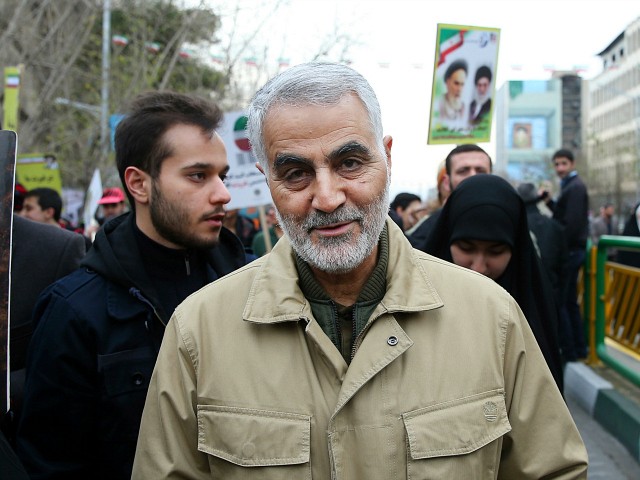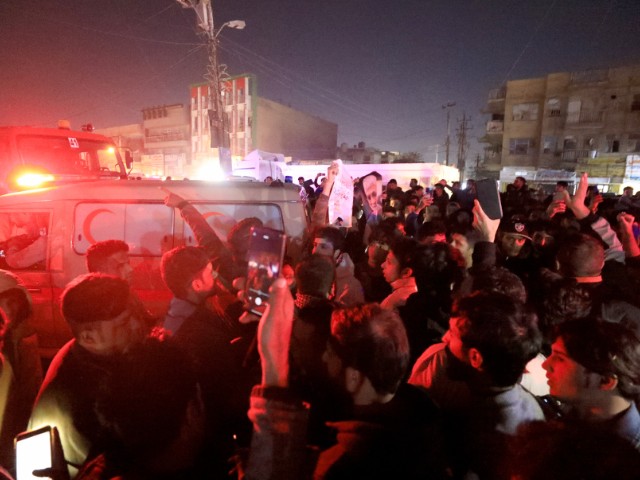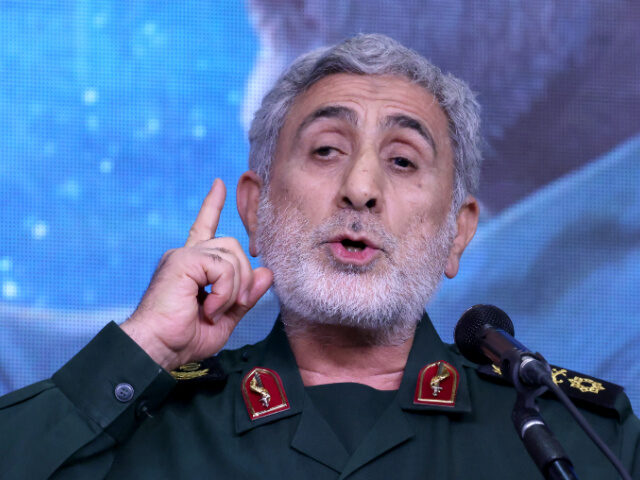The head of Iran’s Islamic Revolutionary Guard Corps (IRGC) Quds Force, Esmail Qaani, told Iran’s terrorist proxies in Iraq to pause attacks on American troops, Reuters revealed in a report citing anonymous sources on Sunday.
The extensive list of unnamed sources – “three Iranian officials, a senior Iraqi security official, three Iraqi Shi’ite politicians, four sources in Iran-backed Iraqi armed groups and four Iraq-focused diplomats” – all corroborated the claim that Qaani made a brief visit to Baghdad to discuss the escalating number of attacks by Iranian proxy forces in Iraq in late January and warned the leaders of several of these organizations that they should “lie low” to avoid a massive American military attack that may pose an existential threat to the groups.
Qaani’s alleged visit follows the killing of three Americans on the Jordanian-Syrian border, announced by President Joe Biden on January 28. The “Islamic Resistance in Iraq,” a coalition of anti-American terrorist groups in Iraq largely believed to be allied to Iran, claimed responsibility for the attack. Kata’ib Hezbollah, an Iran proxy terrorist organization in Iraq widely considered to be part of the “Islamic Resistance,” issued threats to apply “more pressure” to the U.S. presence in the Middle East in the immediate aftermath of the attack.
The Pentagon has confirmed more than 165 attacks on American troops and assets in the Middle East since October 7, when Iran-linked jihadists with the Hamas terrorist organization invaded Israel and engaged in a mass murder, kidnapping, gang rape, and torture spree against multiple residential communities. Hamas terrorists killed an estimated 1,200 people and abducted over 200. Neighboring Muslim states responded to the attack by condemning Israel and amplifying Hamas’s demand for the creation of a “Palestinian” state carved out of Israel.
Defense Department authorities have not documented an attack on Americans since February 4, however – a bizarre halt that Reuters claims is a result of a direct order from Qaani.
Ten of the anonymous sources speaking to Reuters said that Qaani told the leaders of Iran’s terrorist proxies in Iraq that “drawing American blood risked a heavy U.S. response.” Qaani’s visit was reportedly furtive and brief because the IRGC terror chief feared being killed in an American strike. He refused to leave Baghdad’s airport.
“The Iranians learned their lesson from the liquidation of Soleimani and did not want this to be repeated,” a senior Iraqi security source told Reuters.
Qasem Soleimani was the head of the IRGC Quds Force before Qaani, arguably Iran’s most formidable terrorist mastermind, and was responsible for hundreds of American casualties during his tenure at the helm of Tehran’s foreign terror forces. Former President Donald Trump eliminated Soleimani in a drone strike in Baghdad on January 3, 2020, alongside the founder and leader of Kata’ib Hezbollah, Abu Mahdi al-Muhandis. The decision to kill a high-ranking Iranian official prompted many on the American left to condemn Trump for allegedly starting “World War III,” but much of that fervor diminished after the nation’s attention diverted towards the Wuhan coronavirus pandemic.

On Friday, Jan. 3, 2020, Gen. Qassem Soleimani, the head of Iran’s elite Quds Force, was killed in an airstrike at Baghdad’s international airport (AP Photo/Ebrahim Noroozi, File).
Far from triggering World War III, the removal of Soleimani from the battlefield left the IRGC, a U.S.-designated terrorist organization, floundering. Under Qaani, a Soleimani underling with a reputation for being “uncharismatic and a less distinguished military commander” than his predecessor, has led no notable Quds Force operations or generated any fervent following among jihadist sympathizers. The IRGC joined other Iranian terror groups in attempting to target American assets in Iraq and Syria in January, but, instead, bombed a home in Erbil, Iraqi Kurdistan, killing a local businessman and his infant daughter.
Qaani’s plea to Iraqi terrorist groups, according to Reuters, was also not a rousing call to jihad – but, rather, a timid request for the proxies to “lie low” to avoid U.S. strikes on their senior commanders. Qaani reportedly feared that the United States could go so far as to bomb targets within Iran’s borders.
Only one of the militias convened reportedly refused to stop attacking Americans. Kata’ib Hezbollah – the most directly implicated in the strike against Soleimani – was notably among the most enthusiastic in embracing the call to stand down. The group issued a statement on January 30 announcing “the suspension of military and security operations against the occupation forces,” meaning the United States. The group said the pause was necessary “to prevent embarrassment of the Iraqi government,” without elaborating.
The pause has not stopped American operations in the region, particularly in response to the killing of U.S. troops on the Syria-Jordan border. On February 7, Biden authorized a drone strike in Baghdad against senior Kata’ib Hezbollah members – an apparent concession that Trump’s Soleimani strike was effective – killing Abu Baqr al-Saadi, the terrorist believed to be responsible for the group’s drone operations. The terrorists confirmed the killing of Saadi and another member in the strike and congratulated their families on their “martyrdom.”

People inspect the vehicle targeted by an airstrike in Baghdad, Iraq, on February 7, 2024 (Murtadha Al-Sudani/Anadolu via Getty Images).
Secretary-General of Kata’ib Hezbollah, Abu Hussein al-Hamidawi, declared that the drone strike “calls us to remain steadfast in the jihadist approach.”

COMMENTS
Please let us know if you're having issues with commenting.